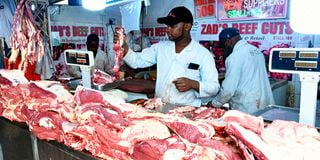Premium
Things no longer meaty as beef prices shoot up

An attendant at Zad’s Butchery and Meat Suppliers stocks up fresh meat at Burma Market in Nairobi on August 31, 2022. At Nairobi’s city market, most of the meat retail shops sell a kilo of beef with bones at Sh550, up from between Sh450 and Sh500 several months ago.
Mr James*, who operates a high-traffic Nairobi City restaurant, has had to suspend some meat products on the menu while raising prices on dishes containing meat, as the product’s prices keep rising.
Since the establishment of the restaurant, only grade one beef — beef without bones — was sold at the restaurant, but in recent months the outlet has had to feed its clients beef with bones while cutting off mutton — a dish that attracted many clients, from the menu, after prices increased by about 40 per cent.
Just last year, the restaurant would get a kilo of beef without bones at Sh550, but the price has shot to highs of Sh850 (a 54.5 per cent increase).
“Because we did not want to raise plate prices for our consumers who are also facing tough economic times, we had to suspend some dishes from the menu while substituting the grade one meat with lesser grades to also make a margin,” the operator says.
He says that the situation has gotten so bad that the restaurant which orders meat even more than once a day when traffic is high is getting the products at different prices within the same day, a problem attributed to a drought that was witnessed since 2021, and the rising fuel prices.
At Nairobi’s city market, most of the meat retail shops sell a kilo of beef with bones at Sh550, up from between Sh450 and Sh500 several months ago in 2022. “We have raised prices by Sh50 since last year, although we have had to absorb some costs thereby cutting our margins so as to sustain our customers by selling a kilo of beef at Sh550,” an operator at a City Market meat outlet says.
While many operators could not explain the technicalities that went behind raising the prices, mainly identifying that they adjusted them upwards after suppliers came with higher prices, the increase in meat prices — mainly beef which is the most consumed by Kenyan households — underlines the pain many have faced in recent months, as butcheries keep raising the prices.
Consumption habits
As many households are faced with high meat prices, many have had to adjust their consumption habits by reducing the number of days they purchase the dish or amounts they purchase, and so have businesses.
In some estates within Nairobi, the price of a kilo of beef is reported to be retailing at Sh580, a situation that appears to cut across.
“For the last half a year the price of beef and related products have gone up, compelling hotel and restaurant operators to review their menu prices and portions. The supply of graded beef and prime cuts is scarce, creating instant impact on retail price which further compounds to higher off-shelf and menu prices felt by the end consumers,” observes a Nation Staff Consumer Society (Nascos) restaurant manager.
The Kenya National Bureau of Statistics (KNBS) official data tracking beef prices shows that since March last year, the price of an average kilo of beef with bones has increased by Sh32 or 6.4 per cent.
The KNBS data show that the last time the average price of the kilo of beef retailed below Sh500 was in March 2022 (selling at Sh499.97), after which the price has risen to reach Sh531.8 by January 2023 — the last time the statistics body tracked beef prices.
Compared to current market prices in Nairobi, up to Sh580 since last year, beef prices have risen by about 16 per cent for most of the consumers, adding more pain to consumers who are already faced with high prices for other food commodities, and a generally high cost of living.





